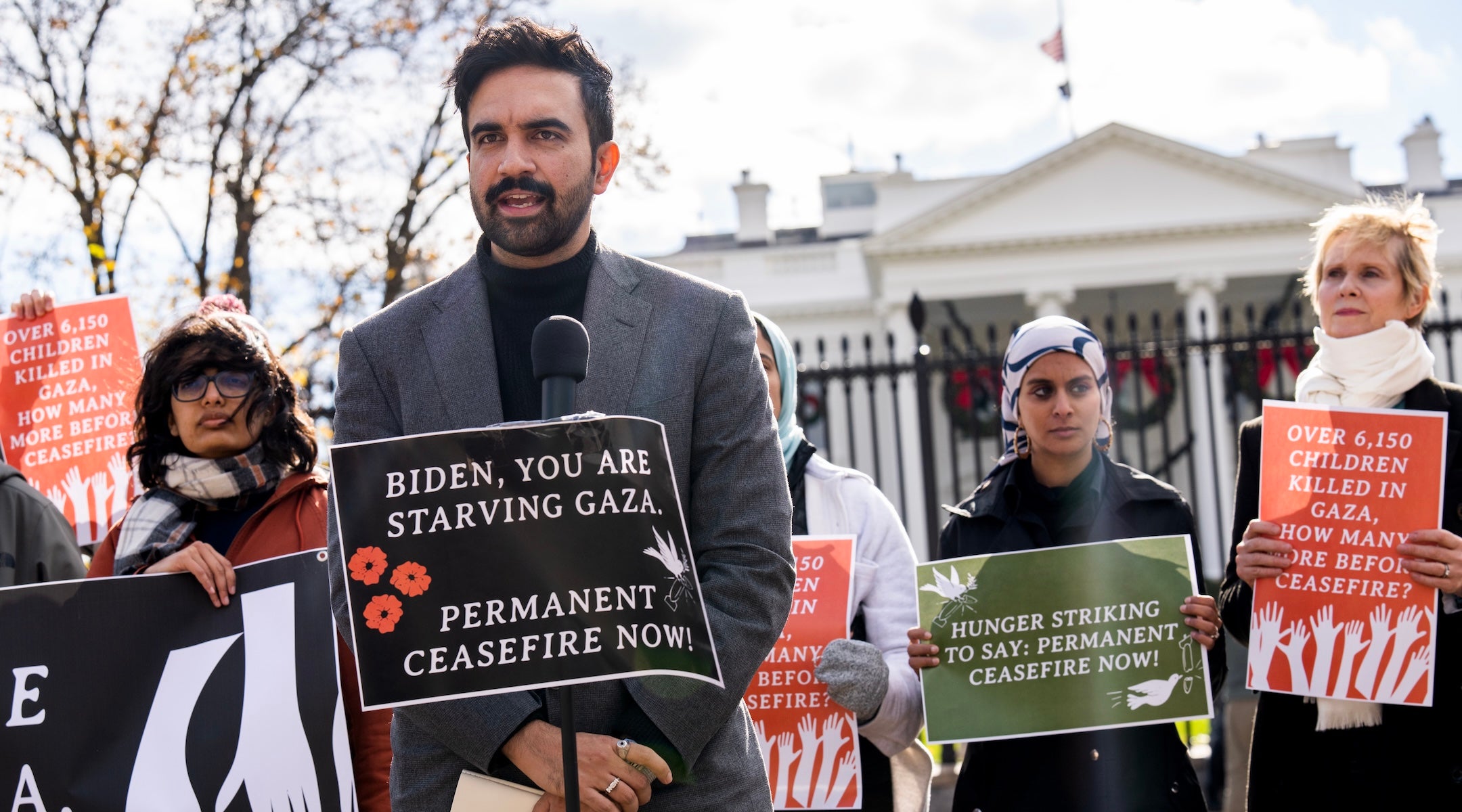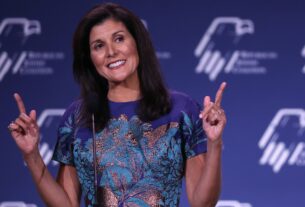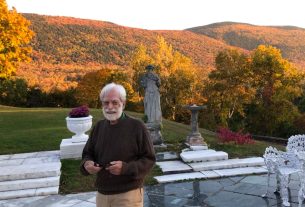It was a Jewish politician, Bernie Sanders, whose surprisingly strong showing in the 2016 presidential primaries brought the Democratic Socialists of America to prominence. Although not a member of the group, Sanders identifies as a “democratic socialist.” The DSA endorsed him, and his candidacy inspired a surge in membership.
Nine years later, the DSA has endorsed another rising progressive star, and this time he is a member: Zohran Mamdani, a member of DSA’s New York chapter, who last week pulled off a stunning upset in the Democratic primary for New York City mayor.
Mamdani’s victory was hailed by those who share DSA’s progressive domestic platform, characterized by a strong social safety net, support for the working class and significant government involvement in the economy.
At the same time, it sent shockwaves among the pro-Israel leadership and mainstream, who view the DSA’s positions on Israel and the Israeli-Palestinian conflict as anathema. The DSA platform accuses Israel of apartheid, colonialism and military occupation, while pledging solidarity with the Palestinian cause. The group considers the Gaza war a genocide; supports BDS, the movement to boycott Israel, and calls for an end to American aid to Israel.
The platform does not endorse any particular formula for resolving the conflict but says any political solution must be grounded in the right of Palestinian refugees to return, an outcome Israel contends would spell the end of its existence as a Jewish state.
Zamdani won while fully embracing the DSA’s policies on Israel, for which he faced blistering accusations of antisemitism.
So what is the DSA and does it actually stand on Israel? Read on for a description of how its position has hardened over time, and the Israel-related controversies it has weathered to reach its current popularity.
A fading friendship
Calling itself the largest socialist organization in the country, the DSA claims to have more than 80,000 dues-paying members, with chapters in every state, and promises to represent the interests of the working class.
Although the DSA’s own political platform calls for “the abolition of capitalism and the creation of a democratically run economy that provides for people’s needs,” political candidates backed by the DSA generally don’t advocate the overthrow of the American government or seek to abolish capitalism. They focus on enacting changes that would make the United States resemble Scandinavian democracies.
Mamdani has himself said that he has “many critiques of capitalism.”
On June 27 he told CNN, quoting Martin Luther King, “In the words of Dr. King decades ago, he said, ‘Call it democracy or call it democratic socialism; there must be a better distribution of wealth for all of God’s children in this country.’”
DSA was not always the home of some of Israel’s staunchest critics, nor a harbor for those calling to boycott the country. In fact, many of the people who helped found the group in 1982 were sympathetic to Zionism, and some even considered themselves friends of Israel.
“[Michael] Harrington was a deep believer in Israel,” DSA co-founder Jo-Ann Mort once wrote of the group’s most prominent early leader. According to Mort, Harrington, who died in 1989, was a friend of Shimon Peres, the late Israeli prime minister, and for a time shared with Peres a skepticism about the cause of Palestinian statehood.
“It’s unlikely that he would have felt at home, were he alive, in the organization he founded,” Mort wrote in Fathom.
DSA’s position on Israel, if anything, stalled the momentum it gained after Sanders’ campaign and nearly discredited the DSA, as many of the politicians who had risen with the party’s backing publicly denounced its response to the Hamas-led massacre of Israeli civilians on Oct. 7, 2023.
Mort, a consultant who has worked with a number of left-leaning Jewish organizations, relayed the history of the movement and Israel in a 2017 essay condemning DSA’s decision to endorse the BDS movement. She argued that democratic socialists should be advocating for peace between Israelis and Palestinians, rather than embracing a political program that would negate Israel’s right to exist.
Losing allies after Oct. 7
Less than two years ago, it seemed that the DSA’s hardline stance on Israel could become too big a liability for progressive politicians, relegating the group back to the political fringe of the pre-Bernie days.
“The Democratic Socialists of America is coming apart at the seams,” Politico wrote in a story about the group’s reckoning on Israel, four days after Hamas and other terrorist groups invaded Israel from Gaza, killing and kidnapping hundreds.
Two prominent progressives who had earned the DSA’s endorsement, Rep. Alexandria Ocasio-Cortez and Jamaal Bowman, then also a House representative, condemned a pro-Palestinian rally promoted by DSA, at which some attendees cheered the massacre of Israeli civilians on Oct. 7. Bowman had already nearly been expelled from the group over a trip he made to Israel and later let his membership lapse over disagreements with DSA about U.S. funding for Israeli defensive weapons.
Rep. Shri Thanedar of Michigan also cut ties with DSA at the time, citing the group’s refusal to unequivocally condemn terrorism as the reason for his departure.
On the West Coast, Los Angeles City Councilmember Nithya Raman, elected with DSA’s support, criticized the organization’s national statement on Hamas’ attack for overlooking the violence carried out by Hamas and for showing a lack of empathy toward Israelis.
And a few months later, in July 2024, DSA withdrew an endorsement from Ocasio-Cortez after she took part in a panel on antisemitism, which DSA claimed was aimed at conflating criticism of Israel with hatred of Jews.
New York City Comptroller Brad Lander, who is Jewish and was another progressive candidate on the Democratic mayoral primary ballot, revealed during his campaign that after the Oct. 7 attack he left the DSA, which he had joined in 1987, citing the group’s response.
Born to the DSA
Mamdani has echoed views on Israel and the Palestinians that are nearly identical to the DSA platform, which is not surprising given that he found his way to democratic socialism through pro-Palestinian activism. As a student at Bowdoin College, a liberal arts school in Maine, he helped found the campus chapter of Students for Justice in Palestine.
After graduating, he thought that Palestine activism would be disqualifying in American politics — until he met Khader El-Yateem. Running for city council in New York in 2017, Palestinian-American El-Yateem was a DSA candidate and BDS supporter, and Mamdani went to work on his campaign.
“He was a socialist, he was pro-BDS, and he was running for local office. These are all things that I had been told could never exist simultaneously in a person,” Mamdani said in a 2021 interview with Jacobin magazine. “And their existence was not a cause for fear or anxiety among so many but, in fact, of inspiration.”
Mamdani also credits the rise of Bernie Sanders for his involvement in DSA organizing. Asked why he came to identify as a socialist, Mamdani started with the values instilled in him as a child — he’s the son of the well-known Indian-American filmmaker Mira Nair and Mahmood Mamdani, an Indian expatriate from Uganda and a prominent professor of postcolonial studies at Columbia University.
“But there was definitely a point at which I started to call myself a socialist, and that was Bernie’s 2016 campaign,” he told Jacobin. “Because I saw all of these beliefs and these values that I held so dear, espoused by a man who proudly called himself a socialist as a result of those beliefs.”
From long shot to frontrunner
Early in this year’s Democratic mayoral primary, Mamdani’s bid was seen as a long shot in part because his politics on Israel were historically disqualifying in a city with more Jewish residents than any other city in the world, including Israel’s largest city, Tel Aviv.
As polling revealed that Mamdani was gaining ground, the race became a contest between him and his chief rival, former New York Gov. Andrew Cuomo, who made fighting antisemitism a central campaign promise. Cuomo attacked Mamdani over his views on Israel. Mamdani’s DSA-aligned positions also became fodder for criticism by many Jewish New Yorkers, who blamed the type of rhetoric he espoused for the reported rise in antisemitism in the city.
But rather than back down, Mamdani stood by the views for which he was criticized.
“My support for BDS is consistent with the core of my politics, which is nonviolence, and I think that it is a legitimate movement when you are seeking to find compliance with international law,” Mamdani said at a candidate forum hosted by the UJA-Federation of New York.
He has also declined, when repeatedly asked, to condemn the pro-Palestinian protest slogan “globalize the intifada,” which many see as a call for violence against Jews in the Diaspora.
He has promised to take the concerns of Jewish New Yorkers about safety seriously if he wins the general election and becomes mayor.
In its official statement welcoming Mamdani’s victory, the DSA did not mention his views on Israel, but rather focused on the candidate as “a representative of a working-class socialist movement.”
“These election results are a rejection of the Democratic Party political establishment and point to a widespread desire for an alternative to the status quo, and the need for the working-class political party DSA is building,” their statement read.
Mort supported Lander, but now that Mamdani has won, she is backing him — and not only because he is the presumptive Democratic candidate. She is willing to look past his affiliation with the DSA because she believes he is not beholden to the group’s “doctrinaire” approach to politics. She also hopes Mamdani changes his position on BDS, if only because taking a position that alienates so many New Yorkers would make it harder for him to govern the city.
“The more I have looked into the way Mamdani ran his campaign, the depth of the support and the sophistication of it, I just can’t help but be very impressed, and I would hope that that would carry over into the way he would govern,” Mort said in an interview. “He has started to reach out to people who are not in his inner circle. I think that’s a good sign.”



